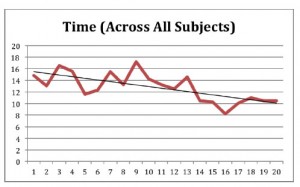 The psychology undergraduates at Michigan Tech have published their research as Volume 1 of the Journal of Midwest Undergraduate Behavioral Research (JMUBR).
The psychology undergraduates at Michigan Tech have published their research as Volume 1 of the Journal of Midwest Undergraduate Behavioral Research (JMUBR).
The research is the outcome of a two-semester series of upper-level courses (PSY 3000/3001 Experimental Methods and Statistics I and II) required for the Bachelor of Science degree in Psychology. The courses in 2012-13 were taught by Assistant Professor of Psychology Shane Mueller.
Research topics were selected by students during Fall 2012, which they saw through from initial concept, two rounds of experimentation (including IRB approval, data collection, and analysis), and final documentation. The educational goal it serves is to motivate the students to think beyond “school” projects, to gain experience doing research, and to write for an audience beyond their classroom. Also, it allows their hard work to get broader exposure, potentially having an impact on the field and yielding concrete material on their vitae/resume for graduate schools and employers to view.
Some highlights from Volume 1 of JMUBR, which is edited by Shane Mueller.
* Two different projects examined the cognitive and personality factors of marijuana users, surveying hundreds of self-identified users, and finding little impact of frequency of use on impulsivity, short-term memory, reaction time, or executive function.
* Two research projects examined how real or perceived task difficulty interacted with personality factors. A third project examined whether physical stressors impacted the perceived or actual difficulty of cognitive tasks.
* Several groups examined very applied problems:
- the utility of infographics over text (they don’t always make a difference)
- whether eating before a test helps performance (no difference between healthy and unhealthy snacks, so go for the cookies);
- why students skip classes (hint: they do it when attendance is not counted for their grade)
- whether listening to music helps or hurts comprehension in comparison to environmental noise (it helps)
- Priming effects on different interaction devices (turns out that touch screens are slower)
Take a look and see what they have accomplished.
The Use of Infographics to Increase Awareness of Student Debt
James N. Greydanus
Michigan Technological University
Department of Cognitive and Learning Sciences
Kristyna J. MacKinnon
Michigan Technological University
Department of Cognitive and Learning Sciences
The Influence of Positive and Negative Verbal Feedback on Task Productivity and Self-Evaluation
Rachel Franchock
Robert Damico
Michigan Technological University
Department of Cognitive and Learning Sciences
Houghton, MI 49931 USA
Assessing Reasons for College Students’ Attendance and Participation in Class
Victoria Hanus
Madeline Peabody
Department of Cognitive and Learning Sciences
Houghton, MI 49931 USA
Marijuana’s Effect on Reaction Time and Response Accuracy
Nick Gravlin
Department of Cognitive and Learning Sciences
Houghton, MI 49931 USA
Assessing the Effects of Physical Demands on Mental Performance
Rachael Huff
Elizabeth Nigro
Department of Cognitive and Learning Sciences
Houghton, MI 49931 USA
The Effects of Music and Environmental Noise on Reading Comprehension
Thomas Gemignani
Department of Cognitive and Learning Sciences
Houghton, MI 49931 USA
Failure Events and their Effect on the Stability of Personality Self-Assessments
William Lehman
Abbey Westphal
Department of Cognitive and Learning Sciences
Houghton, MI 49931 USA
The Effects of Eating Healthy and Unhealthy Food on Recognition Skills
Macy McDonnell
Michael Way
Department of Cognitive and Learning Sciences
Houghton, MI 49931 USA
Assessing Impulsive Personality traits and Short-term Memory Among Self-reported Marijuana Users
Alysa Cherubini
Department of Cognitive and Learning Sciences
Houghton, MI 49931 USA
The Effects of Attentional Cuing and Input Methods on Reaction Time in Human Computer Interaction
Brad Nelson
Michigan Technological University